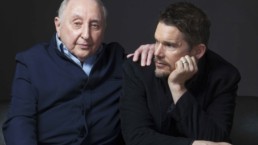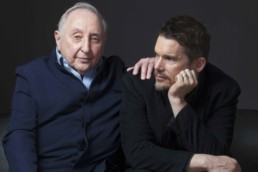Review: ‘Seymour: An Introduction’
Director Ethan Hawke's look at the concert pianist who gave it all up in his search for happiness.
Young hands hover over the tiniest gap of air above the weighted keys of a grand piano; softly, a fine, classical piece takes audible shape to fill a silent and small New York University theater space, where Conservatory students and Professionals alike are present for this Master class. The heartrending romance in the music is lovely, entirely beautiful, and is stopped.
Seymour Bernstein has a note for his student.
Where today’s success-driven culture is measured in madness-driven metrics for total perfection, where new-age Tiger Mom whiplash-parenting is accompanied with seeing the big-screen wallopings laden out by the likes of J.K. Simmons’ salivating drill sergeant of a music teacher in Whiplash, Seymour Bernstein offers a different sort of strive for perfection–a spiritual one.
It’s this distinctness that separates himself from other teachers, musicians, and really, the new American society altogether. It’s this distinctness that inspired actor Ethan Hawke enough to direct a feature-length documentary (also the actor’s first attempt at directing a feature-length documentary), acknowledging, “I never set out to make a documentary. I met Seymour Bernstein at a dinner party and found myself completely hypnotized…There are profound lessons inside Seymour’s piano teachings that are relevant to how we approach our daily lives. His simplicty has much to offer.” Founded by a consuming sort of curiosity over this man’s life and mind, in the aptly titled, Seymour: An Introduction.
Of course, Bernstein himself was once an internationally acclaimed concert pianist prodigy, a handful of onscreen news clippings and reels circa 1930 and ’40 are enough to educate the common viewer who might not be as verse with their classical music history. A broad-stroked biography of the musician’s career might be enough for a kind of documentary, or at least one day’s worth of syllabus in Music History 101, but beyond his wondrous talents as a preeminent musician, Bernstein spins his intrigue and mythos further to our head-cocked confusion, as we learn that he retired from concerts, effectively, as a public performer altogether, and at the height of his career.
Like all things, such as stopping the beautiful music on this day’s class to make this singular note to his student, he did it quietly, gracefully; humbly, but purposefully.
It’s a reverential homage of a movie to Hawke’s existential questioning, and whose every scene provides more clarity into the insight that either the answer is plainly obvious or that there is no real question there to ask at all.
What sort of event would have to happen, then, for a renowned pianist to retire at the ripe old age of 50? What self-tortured anguish must he have experienced to give up what would be assumed to be his life’s calling, the thing that one would think all serious musicians aspire to get to and hang on for dear life when you get there? For Seymour Bernstein, he merely decided that he would give up performing to teach his students and himself about music, happiness and the power of detaching satisfaction from success.
It’s as simple as that.
It’s this fascination, beyond artistic and more personal, that drove Hawke to make this film, to shine the light this way. We see a couple of moments in the film where he accompanies Seymour in frame to express his insecurities about his own artistic struggles, all but asking him to answer what is the meaning of life (but for a thespian, asking what personal fulfillment is by way of creating art is practically asking the same thing). It’s a reverential homage of a movie to Hawke’s existential questioning, and whose every scene provides more clarity into the insight that either the answer is plainly obvious or that there is no real question to ask at all.
We see all angles of Seymour’s life; mostly capturing the sophisticate in his New York single bedroom apartment of nearly all his adult life, dim lights illuminating old pink-painted walls and the collection of knick-knacks over everything, where he conducts personal and private lessons with young students. He also makes his tea and folds out his bedroom’s couch into his bed when he is ready to sleep. When interviewed, Seymour talks into the camera when remembering his musical past, his time spent in Europe during the War, crying when he remembers the thought of lifeless, scattered bodies. Instruments with no music to come out.
This singularly charming man, displaced in this hustling and bustling express lane-living of a culture, proves so fascinating to watch throughout the film’s hour and a half minute run time, because he’s clearly tuned sharper to the intrinsics of living life itself than are the rest of us. Tuned sharper to the emotional importance and component of the musician’s work for which his legend is revered–a lesson that not only hitting the piano’s keys, but the practice of tuning the mind to illicit the honest emotions of the heart and its song, being perhaps the most important type of mastering. This, then, is expressed in the physical transference of weight and pressure to hit the piano’s pockets to play the notes just so, expressing the song’s truest emotional essence.
Seymour, who would sound wizardly if not for the feeling that his always cheery voice could giggle into youthful exuberance at any moment, tells his young apprentice this as the rest of this Master class listens just as intently on–that these notes on the charts are not just notes to be played, but felt. He’s strange for noticing this abstract insight, and only strange because it’s so singularly obvious that he is in fact, correct.
Seymour has his student begin again, at the song’s introduction. An introduction, like all things, should be truthful, and played just right.
‘Seymour: An Introduction’ opens in Los Angeles at The Landmark this Friday.
Ryan Rojas
Ryan is the editorial manager of Cinemacy, which he co-runs with his older sister, Morgan. Ryan is a member of the Hollywood Critics Association. Ryan's favorite films include 2001: A Space Odyssey, The Social Network, and The Master.


